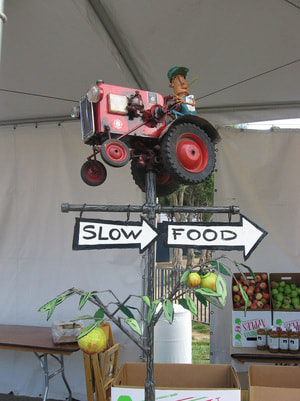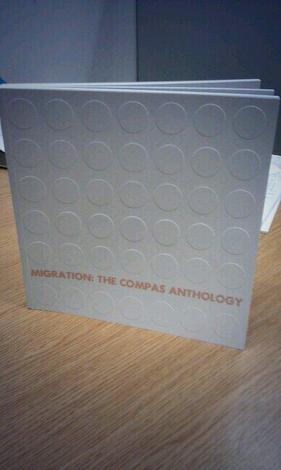|
The film from our final workshop of the more-than-human participatory research project is now available. Our water workshop took place on the 1-2 of October at/on/in the River Torridge. We worked with artist Antony Lyons and members from the North Devon Biosphere Reserve and the Devon Wildlife Trust to explore whether the recent Connected Communities-funded Ethical Guidelines for Community-Based Participatory Research might be extended to working with non-humans, specifically water. Thanks to our film-maker Marietta Galazka.
Originally published on the Sustaining Time blog, part of an AHRC funded project which asks the question: What would be the time of a sustainable economy?  Slow food this way (Laurie O'Neill CC BY-NC-SA 2.0) Slow food this way (Laurie O'Neill CC BY-NC-SA 2.0) The Slow Movement often comes up when I talk to people about the Sustaining Time project. It’s a nice clear way of explaining why you might want to think about time as part of developing more sustainable forms of economics. Slow Food, for example, suggests that a sustainable food system would need to use a very different time to the one guiding industrial agriculture. And of course the slow movement hasn’t stopped there but has been moving into a whole range of different areas, including into research with ‘slow science’ and ‘slow scholarship’ gaining more attention. So I have very much been looking forward to attending the Slow University II seminar, which was held in Durham last week, and included Carl Honoré and Chris Watson as speakers. It seemed like a great opportunity to explore the 'sustaining time of research'. But throughout the event, I found myself becoming increasingly uneasy about the way the Slow ethos was being deployed, particularly in Carl's presentation, and I wanted to explore some of the reasons here. Carl Honoré has been writing about the Slow Movement for some time now and many people at the event had brought along their copy of In Praise of Slow. His presentation covered similar themes to this book, including his own epiphany over needing to slow down when he realised he was constantly rushing through story-time with his son. He also explored a number of examples of the way the slow ethos is showing up in the most unlikely of places including Google’s 20 percent time project, Ariana Huffington’s effort to redefine success with the Third Metric and Jeff Bezos instituting 30 minutes of silent reading before meetings at Amazon. If these businesses could recognise the benefits of Slow why not the university? And so Carl offered three suggestions for what proponent’s of a Slow University might want to focus on:
 Amazon - Official Opening (CC BY-NC 2.0 Scottish Government) Amazon - Official Opening (CC BY-NC 2.0 Scottish Government) The question of who is Slow for? was asked in a couple of reflections on the first Slow University seminar and, I think, continued to be a prominent question at this event. It is a crucial question, because as Sarah Sharma argues in her recent book In the Meantime: Temporality and Cultural Politics “capital invests in certain temporalities - that is, capital caters to the clock that meters the life and lifestyle of some of its workers and consumers. The others are left to recalibrate themselves to serve the dominant temporality” (139). In each of the three large organisations mentioned above, for example, it is very clear that Slow is only for some. As Andrew Norman Wilson’s contribution to FACT’s Time & Motion exhibition uncovers, Google’s used of colour-coded badges determines how much access an employee has to self-directed work time and its time-saving infrastructure of free shuttle buses, meals, haircuts etc. Ariana Huffington has come under regular criticism for her business model based on the free labour of others, including masseurs. And even Carl noted the hellish conditions suffered by workers in Amazon’s ‘fulfilment centres’ (see also my post on the time of Amazon). When I asked about these discrepancies in the implementation of the slow ethos, Carl suggested that the model could be seen as a kind of Trojan horse that has the ability to transform organisations from the inside once it has found an initial foothold. Perhaps he will be proven to be correct, but part of me wondered whether it might not be the other way around. Was neo-liberal capitalism instead turning slow to its own ends, adding slow-washing to its stable of methods that already included green and white-washing? The benefits of Slow were almost completely described in terms of its ability to make you a better worker. Far from being ‘the opposite of a productivity ninja’ as was suggested at the beginning of the seminar, 'slow' seemed to equal 'productive'. For example, Carl talked about the ‘delicious paradox of slow’ where working slow actually allowed you to work faster, producing more than someone caught in a harried, unfocused rush. Described in this way it didn’t seem that the ethos of Slow was operating as a critique of capitalist temporalities of production but might instead be one of its latest incarnations. A core aim for the seminar was to find ways of supporting ‘ethical scholarship for the common good’ through recalibrating the time of the academy. But the focus on individualised experiences of speed and pressure, which seem to dominate the literature on the Slow ethos, suggest that it might have capitulated too easily to what Sharma describes as the “expectation that everyone must become an entrepreneur of time control” (138), where we invent and implement our individualised techniques of slowing down. Such an approach fails to deal with the uneven and unequal ways our time is intertwined with others and thus to confront the “new forms of vulnerability [that] are necessitated by the production of temporal novelties or resistances to speed” (150). Perhaps the core question then isn’t how can the university slow down, but how might it find ways of supporting ‘ethical times for the common good’. Reference: Sharma, Sarah. In the Meantime: Temporality and Cultural Politics. Durham and London: Duke University Press, 2014. |
Archives
November 2022
Categories
All
|

 RSS Feed
RSS Feed
